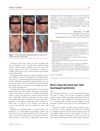 September 2022 in “Journal of Case Reports and Medical History”
September 2022 in “Journal of Case Reports and Medical History” Many new moms lose hair after childbirth due to hormonal changes, but it usually grows back within a year.
 1 citations,
January 2022 in “Skin appendage disorders”
1 citations,
January 2022 in “Skin appendage disorders” Hair shedding after childbirth can reveal a pre-existing condition of hair loss due to tight hairstyles.
 144 citations,
July 2002 in “Clinical and Experimental Dermatology”
144 citations,
July 2002 in “Clinical and Experimental Dermatology” Telogen effluvium is a common type of hair loss that can resolve on its own or become chronic, with treatment depending on early diagnosis.

Postpartum hair loss can reveal hidden hair loss conditions.
 214 citations,
March 1993 in “Archives of Dermatology”
214 citations,
March 1993 in “Archives of Dermatology” Telogen effluvium is a reversible hair loss condition that requires a detailed diagnosis and often resolves on its own.
 November 2024 in “Applied Sciences”
November 2024 in “Applied Sciences” Placenta products might help with hair loss, but more research is needed.
 7 citations,
January 2015 in “Journal of the European Academy of Dermatology and Venereology”
7 citations,
January 2015 in “Journal of the European Academy of Dermatology and Venereology” Only about 20% of women have hair loss after childbirth severe enough to be considered clinically significant.
 9 citations,
January 2015 in “Skin appendage disorders”
9 citations,
January 2015 in “Skin appendage disorders” The article suggests that the belief in common postpartum hair loss lacks sufficient evidence and may be overestimated.
 17 citations,
March 2006 in “Journal of Cosmetic Dermatology”
17 citations,
March 2006 in “Journal of Cosmetic Dermatology” Hormonal changes during and after pregnancy can cause hair growth changes and hair loss, with treatments available for some conditions.
 January 2017 in “Archives of Aesthetic Plastic Surgery”
January 2017 in “Archives of Aesthetic Plastic Surgery” Hair care products with placental growth factor can improve hair thickness and density in postpartum hair loss.
September 2023 in “Ukraïnsʹkij žurnal Perinatologìâ ì pedìatrìâ” Quick action and prevention are crucial to avoid severe complications from tourniquet syndrome in children.

Oral contraceptives may cause significant hair loss in women.
 16 citations,
August 1967 in “JAMA”
16 citations,
August 1967 in “JAMA” Oral contraceptives may cause hair loss in women.
 February 2010 in “Journal of The American Academy of Dermatology”
February 2010 in “Journal of The American Academy of Dermatology” Babies born after 38 weeks to mothers under 36 years old and not delivered by C-section have a higher risk of neonatal occipital alopecia.
 5 citations,
September 2016 in “Journal of Cosmetic Dermatology”
5 citations,
September 2016 in “Journal of Cosmetic Dermatology” Nourkrin® with Marilex® may increase hair count by 35.7% in postpartum hair loss.
 8 citations,
March 1979 in “International Journal of Dermatology”
8 citations,
March 1979 in “International Journal of Dermatology” Dr. Vera H. Price's 1979 work emphasizes the importance of accurate diagnosis and personalized treatment for hair loss.
February 2024 in “Animals” Hair loss peaks in spring and regrowth in late summer, with pregnant females losing the most hair.
 February 2009 in “Springer eBooks”
February 2009 in “Springer eBooks” Pregnancy can cause more body and scalp hair growth and make nails brittle, but these changes often revert after giving birth.
 3 citations,
February 2008 in “Basic and clinical dermatology”
3 citations,
February 2008 in “Basic and clinical dermatology” Telogen Effluvium is a hair loss condition where treatment involves identifying and managing its triggers.
 April 2023 in “Clinical dermatology review”
April 2023 in “Clinical dermatology review” COVID-19 infection may cause hair loss.
 January 2019 in “Kocaeli tıp dergisi”
January 2019 in “Kocaeli tıp dergisi” People with chronic hair loss may have a higher chance of Vitamin B12 deficiency.
 21 citations,
January 2016 in “Skin appendage disorders”
21 citations,
January 2016 in “Skin appendage disorders” Alfredo Rebora suggested a new, easier way to classify hair loss in Telogen Effluvium, adding a type possibly related to autoimmune diseases.
 67 citations,
January 2013 in “Indian Journal of Dermatology, Venereology and Leprology”
67 citations,
January 2013 in “Indian Journal of Dermatology, Venereology and Leprology” Chronic Telogen Effluvium may resolve after years and is diagnosed by examining the patient's history and clinical signs, with treatment aimed at underlying causes and possibly minoxidil.
 April 2012 in “Informa Healthcare eBooks”
April 2012 in “Informa Healthcare eBooks” Telogen effluvium is a common hair loss condition where many hairs enter the resting phase, often not noticeable until significant loss occurs, and treatment focuses on the underlying cause.
 24 citations,
May 1963 in “Archives of Dermatology”
24 citations,
May 1963 in “Archives of Dermatology” Most new moms had their hair grow back within 4-6 months after childbirth, and hair loss is likely due to hormonal changes.
 75 citations,
October 1996 in “Dermatologic Clinics”
75 citations,
October 1996 in “Dermatologic Clinics” Chronic Telogen Effluvium is a hair loss condition in middle-aged women that usually doesn't lead to complete baldness.
 141 citations,
January 1984 in “Journal of The American Academy of Dermatology”
141 citations,
January 1984 in “Journal of The American Academy of Dermatology” Pregnancy can cause skin darkening, varicose veins, more sweating, hair growth, hair loss after birth, nail changes, and gum inflammation.
 4 citations,
February 2014 in “Journal of the European Academy of Dermatology and Venereology”
4 citations,
February 2014 in “Journal of the European Academy of Dermatology and Venereology” Early diagnosis of hair tourniquet syndrome saved a baby's toe from being lost.
 32 citations,
January 1997 in “Dermatology”
32 citations,
January 1997 in “Dermatology” Telogen effluvium is a hair loss condition with acute cases resolving quickly and chronic cases potentially lasting longer, sometimes requiring treatment.
 234 citations,
December 1996 in “Journal of The American Academy of Dermatology”
234 citations,
December 1996 in “Journal of The American Academy of Dermatology” Middle-aged women with chronic telogen effluvium experience increased hair shedding but usually don't get significantly thinner hair.




























